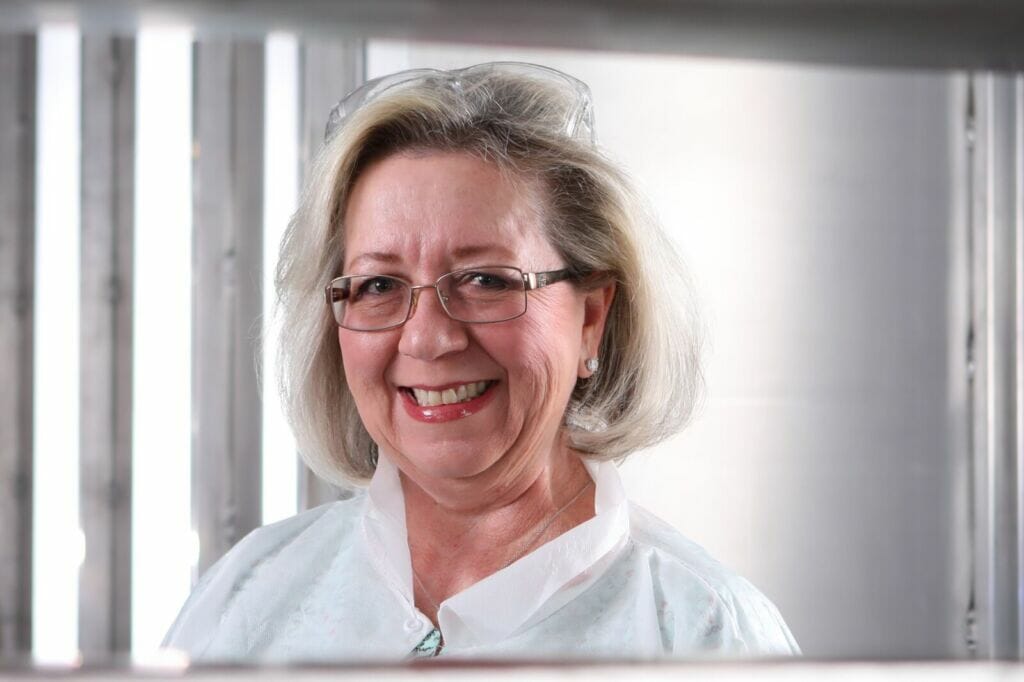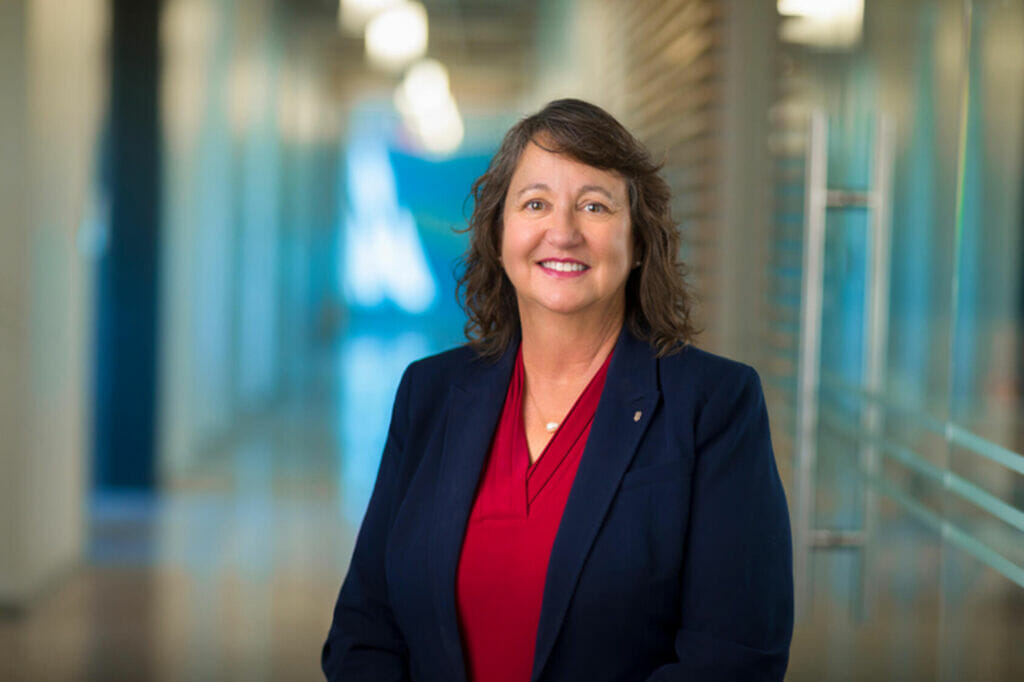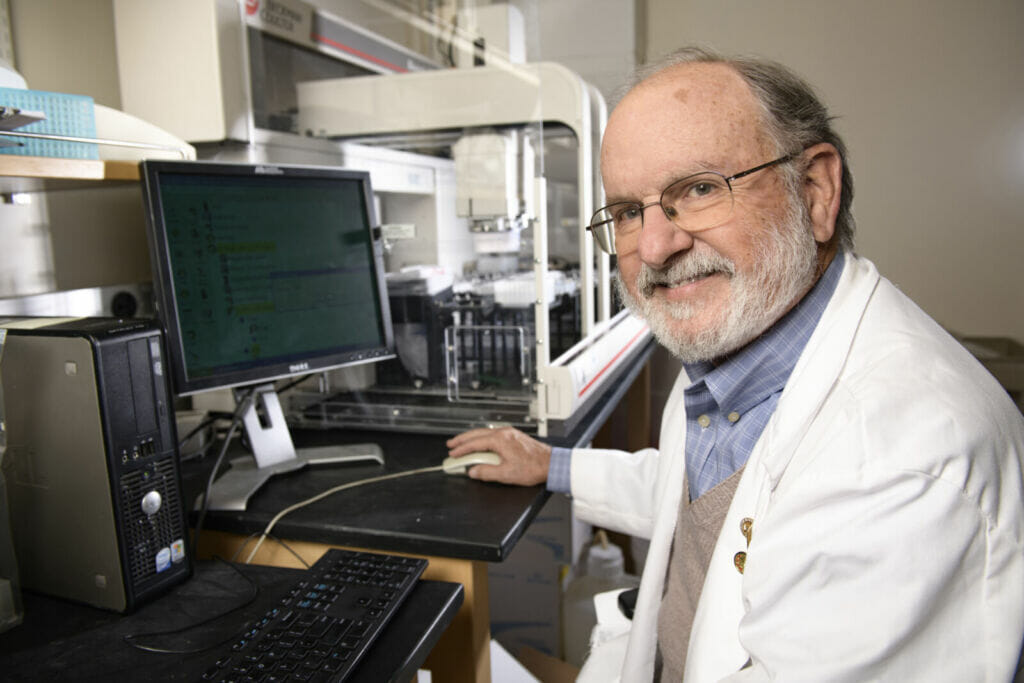As part of Arizona Bioscience Week, the Arizona Bioindustry Association (AZBio) held it annual awards Wednesday at the Phoenix Convention Center. Hosted by AZBio CEO Joan Koerber-Walker, the packed event honored the most innovative bioscience leaders and companies in Arizona. Here are the winners of the 2023 AZBio Awards:

2023 Arizona Bioscience Educator of the Year
Barbara Marusiak
When you were growing up, was being a healthcare innovator on your future career list? Probably not. Inspiring the next generation of innovators depends on talented and committed educators who open educational pathways and inspire students to embark on them.
Barbara Marusiak, senior director of clinical research and regulatory science at Arizona State University’s Edson College of Nursing and Health Innovation, has mentored, educated and motivated undergraduate and graduate students in research for more than 10 years. She is one of these educators.
READ MORE: Learn more about AZBio’s 20 years of impact
She has guided over 300 ASU students in major research projects in clinical research and regulatory science, many of which led to work in the field, publications in peer reviewed journals, presentations at scientific conferences and poster presentations.
Companies who have had hired graduates from the program have often requested additional students, impressed with their work and the support of Barbara as the supervisor and facilitator. Individuals who were not certain about a career have found positions in the biosciences that they are passionate about. Students and alumni often credit Barbara with being instrumental in their choosing the bioscience field and pursuing careers in the field.
Barbara has created and directs the Clinical Regulatory Industry Alliance (CRIA) for the Clinical Research and Regulatory Science Programs at ASU. CRIA engages industry and clinical sponsors to provide opportunities to collaboratively address industry unmet needs and expose students to the field. In just a short time, she has developed relationships with more than a dozen biomedical organizations and has placed students in experiential projects in several of them.
CRIA has established a strong relationship with the ASU-Mayo Accelerator Program, which supports eight biomedical companies each year in their research and efforts to bring new biomed products to market. This has provided opportunities not only for our students but students in other majors to discover bioscience and the tremendous possibilities and opportunities associated with the field. Many of these companies are doing clinical trials in Arizona.
She has been instrumental in working with a partner company from Germany who will be opening their first Phase I/II research center in the U.S. in Phoenix. This company works with many of the big pharma companies which will bring new opportunities and recognition to Arizona in bioscience. Barbara is an avid proponent of health innovation, mentoring the future professionals and leaders in the field, promoting the opportunities to students in many forums, and increasing the number of applicants and students interested in the biosciences as a career. Through CRIA, Barbara is expanding the bioscience and biomedical landscape in Arizona not only to students, but to companies that will bring business and opportunities to the state.
Barbara Marusiak, DHSc is a major force in the bioscience and biomedical fields, not only supporting and promoting it, but providing our next leaders. She is being honored as the 2023 Michael A. Cusanovich Arizona Educator of the Year.

2023 Arizona Bioscience Leader of The Year
Brad Halvorsen
In 2002, the Flinn Foundation, a privately endowed, philanthropic grantmaking organization that had historically focused on health care and biomedical research, led the creation of Arizona’s Bioscience Roadmap: a long-term strategic plan and statewide collaboration to bring Arizona to bioscience prosperity. The plan aimed to strengthen and diversify the state’s economic base while offering Arizonans first access to the latest health care innovations. The Roadmap was updated in 2014 with the goal of Arizona becoming globally competitive and a national leader in select areas of the biosciences by 2025.
Brad Halvorsen had become the Flinn Foundation’s first communications officer in 1989 after serving as a press aide and campaign press secretary to U.S. Senator Dennis DeConcini. In 2002, he embraced the challenge of informing Arizonans about the promise of the biosciences and the Roadmap, both new concepts to most Arizonans. For the next decade, the heart of his responsibilities was giving voice to the state’s progress toward the Roadmap’s goals, as he led Flinn’s collection and dissemination of performance data and annual convenings of state leaders to build momentum.
In 2015, Brad was appointed Executive Vice President of the Foundation, a role he still holds. He supports President & CEO Tammy McLeod, Ph.D., in leading the directions and operations of the Foundation overall and has provided strategic leadership for several of the Foundation’s initiatives, including oversight of Arizona’s Bioscience Roadmap and its Steering Committee, the Bioscience Entrepreneurship Program, and the Flinn Scholars Program.
“Inside the Flinn Foundation, Brad is a champion of his colleagues, making all of us better at what we do, and his wealth of experience is vital to setting direction for our grantmaking and programs and anticipating the consequences of actions we want to take,” said Dr. McLeod. “He applies the same insight to Flinn’s work out in the community, especially as we foster collaborations across organizations in the biosciences to benefit the whole state.”
Brad’s leadership in guiding the Foundation’s programs has strengthened countless organizations, companies, and individuals. The Roadmap, now the longest-running statewide plan of its kind, continues to bolster the decision-making of cornerstone institutions, executives, and policymakers committed to the rapid growth of Arizona’s bioscience sector. The Entrepreneurship Program that Brad has overseen now counts 60 early-stage companies among its participants, with 90% remaining in business or being acquired.
Meanwhile, the Flinn Scholars Program, entering its 39th year, has created life-changing opportunities for over 700 Arizona students who have earned full-ride merit scholarships through a partnership with Arizona’s three state universities. Many of these Flinn Scholars have chosen careers here in Arizona in the biosciences, health care, and entrepreneurship.
A leader, who through decades of service has made a significant impact on developing Arizona’s bioscience sector, Brad Halvorsen is being honored as the 2023 Jon W. McGarity Arizona Bioscience Leader of the Year.

2023 Arizona Bioscience Researcher of the Year
Lisa Rimsza, MD
Lymphoma is a cancer of the lymphatic system, which is part of the body’s germ-fighting network. The lymphatic system includes the lymph nodes (lymph glands), spleen, thymus gland and bone marrow. Lymphoma can affect all those areas as well as other organs throughout the body. Diffuse large B-cell lymphoma (DLBCL), the most frequent type of lymphoma in the US, displays a varied prognosis and response to therapy. In this particular type of lymphoma, cell of origin has significant prognostic implications and a dependable reproducible assay with broad application is essential for best possible patient care.
The 2023 Arizona Bioscience Researcher of the Year, Dr. Lisa Rimsza, is seen as a world leader in lymphoma biology. She is not only at the forefront of research but is also an expert in clinical hematopathology.
Dr. Rimsza has an extensive track record of translational research that directly addresses the unmet needs of patients with cancer, using an individualized therapy approach. She has shared her work in more than 200 peer reviewed publications. Her published work and ongoing projects exemplify Dr. Rimsza’s expertise and consistent focus in tissue based translational research from discovery to assay development for use in clinical trials or commercialization for use in clinical practice. As a Clinician-Investigator, she has used her expertise as a diagnostic hematopathologist to identify important gaps in the management of patients with lymphoma.
Dr. Rimsza has maintained an NIH-funded laboratory for 25 years. The focus of her lab includes basic tumor genomics, functional studies, biobanking, support of clinical trials, and assay development including bringing assays through patenting to laboratory developed tests to licensing to FDA registrational studies. She also serves on the Scientific Advisory Board of the Lymphoma Research Foundation, which oversees much of the privately funded lymphoma research in the US.
In collaboration with the Leukemia Molecular Profiling Project (LLMPP), Dr. Rimsza identified a gene signature for accurate molecular sub-typing of diffuse large B cell lymphoma (DLBCL). She then used this signature to develop a clinical assay, called the “Lymph2Cx”, which was patented by the National Cancer Institute. In 2016, she started offering this clinical assay for Mayo Clinic patients through the Molecular Diagnostics Arizona Laboratory (MDAZL). A commercial license was issued for this invention. Dr. Rimsza has helped commercialize the Lymph2Cx with the technology platform developer (Nanostring, Seattle, WA) as a companion diagnostic and as a stand-alone in vitro diagnostic kit. This example, along with 6 other patent licenses, illustrates Dr. Rimsza’s ability to perform impactful research that moves effectively from bedside to bench and back to bedside, affecting the treatment of many patients.
Dr. Rimsza has also made other significant advances in this field of research, which form a pipeline of products to address the management of patients with lymphoma.
A life-long educator, Dr. Rimsza has mentored many colleagues, residents, fellows, and medical students. Leading by example, she is inspiring our next generation of bioscience researchers and clinicians.
2023 AZBio Public Service Award
Senator David Gowan
Arizona’s Bioscience Roadmap was turning 20 and Arizona’s health innovation leaders were reviewing past performance and looking for opportunities for future growth. Based on the data, three things needed to happen for Arizona’s health innovation sector to double its economic impact of $38.54 billion: support its entrepreneurs; prepare its workforce; and increase levels of early-stage investment into high potential life science startups.

Based on a three-year best practices study that looked at programs that were successfully accelerating health innovation sectors nationally and internationally, the team developed a business plan. They also needed a champion at the Arizona legislature.
David Gowan was first elected to the Arizona House of Representatives in 2009. During the 2015-2017 legislative session, he served as the 52nd Speaker of the House. He was elected to the Arizona State Senate in 2018 and reelected in 2020 and 2022.
Senator David Gowan was chairman of the Senate Appropriations committee. He and his wife Jessie are longtime residents of Southern Arizona where they raised two sons. A proud graduate of the University of Arizona, he was actively engaged in supporting the work of researchers and educators across the state, and had a reputation as a visionary, strategic leader who was passionately committed to serving the people of Arizona.
Senator Gowan carefully reviewed the data and the plan then engaged with legislative counsel and the State Treasurer’s Office to develop the legislation that would establish the Arizona Health Innovation Trust Fund.
Established in 2022, the Arizona Health Innovation Trust Fund (A.R.S. 41-1770) was created with the State Treasurer as trustee. The trust fund is a permanent endowment fund that consists of monies appropriated by the legislature, earnings from the fund and gifts or grants donated or given to the fund. The funds are invested and, upon maturity, the state treasurer annually allocates four percent of the monies in the trust fund to a 501(c)(3) charitable organization that will provide entrepreneurial education, mentoring and support to persons in the health innovation and health care delivery sectors in Arizona; provide workforce development programs designed to support the talent requirements of employers in Arizona’s health innovation and health care delivery sectors; and provide programs that support the development and commercialization of health innovation by businesses that are based in our state and that employ not more than one hundred employees. Each year, the charitable organization submits a report as prescribed by the law to Arizona’s executive and legislative leaders. The legislature also allocated $100,000 to the state treasurer’s budget to establish the fund.
Once the law became effective, the Arizona State Treasurer’s Office followed its process to select the organization that would work with ASTO and receive future distributions from the trust. On December 29, 2022, a contract was signed with the Opportunity Through Entrepreneurship Foundation to receive the distributions from the trust and deliver the services required in the statute as part of its AZAdvances initiative.
In 2023, Senator T.J. Shope sponsored and Senator Gowan co-sponsored SB1084 requesting $200 Million be deposited into the trust fund. While funding was not included in Arizona’s FY24 budget, discussions are ongoing with public and private sources on how to best grow the trust to its $200 million goal as soon as possible.
For his vision and commitment to helping Arizona become home to a world class health innovation sector, Senator David Gowan is being honored with the 2023 AZBio Public Service Award.

2023 Arizona Pioneer Award for Lifetime Achievement
John Galgiani, MD
If you live in Arizona, you should know about Valley fever. Coccidioidomycosis, or ‘cocci,’ is the medical name for what is primarily a disease of the lungs caused by the inhalation of airborne particles of the fungus Coccidioides. The “Valley” of Valley fever is California’s Central Valley, where the disease was first identified in the U.S., but with the population explosion in south central Arizona, two-thirds of the nation’s 150,000 annual infections come from here. Valley fever’s economic impact is $1.5 billion annually, and within endemic regions such as Phoenix, the risk of developing serious consequences is similar to that of polio, measles and chicken pox before there were vaccines.
John Galgiani, MD, director of the Valley Fever Center for Excellence at the University of Arizona College of Medicine – Tucson, is widely recognized as one of the leading experts on Valley fever. He is the author of more than 250 scientific papers and book chapters, most of which focus on medical mycology in general and Valley fever in particular. He has focused on the disease since his infectious disease fellowship at Stanford University in 1976. He joined the University of Arizona College of Medicine in 1978, and in 1996, the Arizona Board of Regents accepted his proposal to establish the Valley Fever Center for Excellence. The center provides education about Valley fever, helps patients with the severest complications of this disease, and researches the fungus that causes it.
Knowing about Valley fever and the symptoms it usually causes is valuable to anybody living or visiting areas where the disease is endemic. Approximately 60% of people who contract Valley fever do not develop symptoms serious enough to warrant a clinic visit. The roughly 30% who do get sick most often are told that their symptoms – which can include cough, chest paint, muscle and joint aches, and fatigue – are caused by pneumonia. But having those symptoms in Arizona means there is approximately a 1-in-4 chance the infection is actually Valley fever. Unfortunately, even here, doctors’ awareness of the disease and when to test for it is surprisingly low.
Early diagnosis of Valley fever has many benefits. People who know about Valley fever before they get sick are diagnosed sooner because they ask their doctor for the blood test. Once the correct diagnosis is made, other diagnoses can be ruled out and ineffective treatments that may have been prescribed, such as antibiotics, can stop. Those with more serious forms of Valley fever benefit from earlier diagnosis because receiving appropriate treatment sooner can help prevent much of the damage that the disease can inflict if left unchecked.
Valley fever researchers are pursuing several lines of investigation. Because cocci can affect people differently based on subtle differences in multiple genes, Dr. Galgiani has established a collaboration with National Institutes of Health scientists that may lead to the development of genetic tests to predict how serious a person’s Valley fever infection might become. While the diagnosis of Valley fever involves a simple blood test, results take at least days, and sometimes weeks, to become available to the treating doctor. The Valley Fever Center for Excellence is collaborating with others to develop rapid point-of-care tests that would greatly improve early disease diagnosis and management. ABOR and the University of Arizona Health Sciences have funded the Valley Fever Collaborative, a collaboration between Northern Arizona University, Arizona State University, and Valley Fever Center for Excellence investigators to better understand the environmental biology of the fungus within its desert soil habitat and the impact of climate change on the fungi’s spread. Since Arizona is the epicenter of this disease, it is quite appropriate that Arizona leads in solving this problem, which is true to Dr. Galgiani’s vision for establishing the Center 26 years ago.
It’s been almost 30 years since a new treatment for Valley fever became available. Fluconazole, originally marketed as Diflucan, is an antifungal drug used for the treatment of both systemic and superficial fungal infections in a variety of tissues. It was initially approved by the FDA in 1990 and is one of the few options doctors have for treatment of Valley fever. For more than 25 years, Dr. Galgiani was the subproject director for Valley fever clinical trials conducted by the NIH-supported Mycoses Study Group. Among many studies by this group, he led the seminal multicenter trial of fluconazole treatment for Valley fever meningitis, which completely changed the management of this life-threatening complication. In 2007, Dr. Galgiani co-founded Valley Fever Solutions Inc., an Arizona corporation working to develop Nikkomycin Z (NikZ) as a potential cure for Valley fever. That company continues to work toward developing this new treatment.
Since Valley fever creates life-long immunity, the hope of a preventative vaccine has driven research to find one. Valley Fever Center investigators discovered that the deletion of a particular gene from the fungus renders it unable to cause disease. When the gene-edited fungus was used to vaccinate mice, it produced very strong resistance to subsequent infection with the virulent fungus. This discovery led to an NIH award for the Center and its commercial partner, Anivive Lifesciences, to develop a canine vaccine, which has proven effective in laboratory testing and may result in a veterinary product within the next year. Now, with additional expertise from Crozet Biopharma, the focus is to continue a public-private partnership to develop the vaccine for humans.
Dr. Galgiani’s unwavering commitment to Valley fever education, research and improved treatments for people and animals affected by this disease is why he deserves to be recognized with the AZBio Pioneer Award for Lifetime Achievement.
2023 AZBio Fast Lane Honorees
Aesthetics Biomedical Inc.
Since the earliest recorded times, youthfulness and beauty have been prized by many. However, the science of aging is far from simple. Our skin is the largest organ in our body and exhibits the most visible and earliest signs of aging.
Scientists have discovered ways to stimulate your skin’s own healing process, so it produces more collagen and elastin. These proteins keep your skin firm, smooth and more youthful looking.
Aesthetics Biomedical® Inc., founded by Chief Executive Officer MaryAnn Guerra in 2016, is at the forefront of personalized aesthetic treatments and device development. Building on its established radiofrequency (RF) microneedling success with the Vivace® Microneedle RF, Aesthetics Biomedical® Inc. received FDA clearance in October 2022 for its newest device, the Vivace Ultra™, which allows for precise and personalized treatment with industry-first, linear-array ultrasound technology to map specific depth and determine individualized settings for each patient’s specific skin and concerns.
This newest generation of personalized RF Microneedling is also the first to be designed and manufactured in the United States, specifically in Arizona.
In its limited commercial release stage, Vivace Ultra™ has already earned prestigious editorial awards from ELLE, NewBeauty, Cosmopolitan, InStyle and Good Housekeeping. Aesthetics Biomedical® Inc. also designed, patented and released SoME® Skincare — the first autologous topical skincare product in the world — that preserves an individual’s own platelet rich plasma (PRP) for up to 120 days, allowing long-term at-home use of PRP, which typically degranulates in four to six hours without Aesthetics Biomedical’s proprietary technology.
In the past year, SoME® Skincare has launched in 26 countries across the globe and will be introduced into new countries as demand continues to increase. This product is also manufactured in Arizona.
Aesthetics Biomedical® Inc. continues to refine its regulatory, clinical and marketing efforts to ensure it remains world-class.
Aesthetics Biomedical® has 50 employees and continues to grow. They are proud of their track record for hiring Arizona college graduates.
For the progress it is making in building and growing an Arizona-based medical device and aesthetics company, Aesthetics Biomedical® Inc. is being honored with a 2023 AZBio Fast Lane Award.
CND Life Sciences
Neurological conditions can be difficult to diagnose. Diagnostic uncertainty can lead to delays in patient care and introduce the possibility of unnecessary tests, procedures and medications, along with increased anxiety for the patient and family. Equipping neurologists with reliable information to aid in the diagnosis of these challenging disorders provides a critical foundation for optimal patient care.
CND Life Sciences (CND), a medical technology company pioneering the development of cutaneous neurodiagnostics, is dedicated to supporting the care of patients facing the potential diagnosis of a neurodegenerative disease and other neurological disorders.
Operating a CLIA-certified and CAP-accredited laboratory in Scottsdale, CND launched the Syn-One Test® in 2019 as the world’s first commercially available test to detect, visualize and quantify phosphorylated alpha-synuclein located in cutaneous nerves. The test, which analyzes small skin biopsies collected from the patient in a clinician’s office, improves the diagnostic accuracy of diseases like Parkinson’s disease, dementia with Lewy bodies, multiple system atrophy, pure autonomic failure and REM sleep behavior disorder. With data demonstrating the highest sensitivity and specificity for any biomarker test for this group of diseases called synucleinopathies, the Syn-One Test leverages a decade of published science from leading academic institutions in multiple countries. CND has research collaborations with multiple biopharmaceutical companies and has been awarded three prestigious NIH SBIR grants to advance the validation and clinical utility of its Syn-One Test.
Since 2021, CND has experienced rapid growth. Starting with 10 employees, the company now has over 65 and expanded its talent pool across the country. On March 30, 2023, CND celebrated the grand opening of its global headquarters in Scottsdale. Occupying adjacent locations totaling 15,000 square feet, the headquarters includes modern laboratories and office space for commercial testing and research and development activities.
“We are delighted to have the CND Life Sciences global headquarters and laboratories in Scottsdale,” says Rick Morello, chief executive officer of CND Life Sciences. “Our main facility and adjacent space provide CND with additional capacity needed to accelerate our mission and meet the growing demand for novel and effective diagnostics for neurodegenerative diseases.”
In early 2023, CND closed a $4.5 million Series Seed 3 equity financing round. This follow-on round brought the company’s total seed financing to $12.5 million to accelerate the commercialization of the Syn-One Test and advance important research and development initiatives. In parallel, CND also received a $4.2 million grant from the State of Arizona through the American Rescue Plan Act (ARPA) to study the detection of neuropathologies that may be present in cutaneous nerves of patients suffering from Long COVID.
The next phase for CND includes advancing the capabilities of its Syn-One Test® by further examining the pathological profiles or biosignatures found in patients’ skin biopsies to help distinguish a specific disease type from another. Referred to as Synuclein Signatures™, this important technology could be a key aspect of how CND collaborates with biopharmaceutical companies developing disease-modifying therapies for patients suffering from neurodegenerative diseases. Additionally, CND is investing in digital pathology and the use of artificial intelligence to enhance its detection and quantification capabilities while supporting future growth and scalability in the lab.
For the progress it is making in building a growing Arizona medical technology company, CND Life Sciences is being honored with a 2023 AZBio Fast Lane Award.
Reglagene
When a young company sets out to address a significant unmet medical need, its team becomes the most vital asset. In November 2016, a groundbreaking discussion transpired between Dr. Richard Austin (formerly of Sanofi and GSK) and esteemed University of Arizona faculty, Dr. Laurence Hurley and Dr. Vijay Gokhale. They grappled with the stark reality that no significant therapies have been developed for the deadliest brain cancers since 1999. Sparked by this meeting, the scientists co-founded Reglagene, committing to create improved solutions for patients battling primary and secondary brain tumors.
Reglagene, a pioneer in brain disease therapies, has achieved considerable research milestones in the last 18 months, providing hope to brain cancer patients. In this challenging field where median survivals post-diagnosis are just over a year, Reglagene’s unwavering commitment to finding effective treatments shines brightly.
Under Dr. Austin’s leadership, a team of exceptional individuals emerged, embracing not merely a job, but a calling. They’ve worked tirelessly to ensure a new therapy for patients, combining their R&D capabilities with global service providers’ expertise and reknowned academic partners. This synergy has laid the foundation for an agile and scalable drug development engine, extending its reach from cancer therapies to treating brain inflammation-triggered diseases.
In 2023, Reglagene reached a transformative milestone in its brain cancer program. After testing over 900 drug prototypes, they identified RGN6024 as their clinical development candidate. Using the most validated mechanism in cancer therapy history, RGN6024, with its exceptional ability to penetrate the blood-brain barrier — rivaling best-in-class brain cancer therapies — is set to enter the clinic in 2024, marking a significant step in the fight against brain cancers.
Securing funding for the company’s research and development needs is a challenge that Reglagene has met head-on, locally and nationally. Traveling coast to coast and points in between, the company has continually pursued recognition for its excellence and advanced technology, built strategic relationships and sought necessary funding to create potentially lifesaving cures.
“From our inception, our mission at Reglagene has been to develop innovative therapies for those battling formidable brain diseases,” says Dr. Richard Austin, Reglagene’s co-founder. “Our dedication comes from a shared belief that no challenge is too great if it provides hope to patients and their families. Receiving the 2023 AZBio Fast Lane Award is both a humbling acknowledgment of our journey and a powerful validation reinforcing our commitment to relentlessly pursuing innovation in brain disease research.”
Reglagene’s 2023 AZBio Fast Lane Award honors the dedication of its Arizona-based employees and the life-changing impact their breakthroughs have on patients. By highlighting their exceptional achievements, AZBio underscores the critical need for continuous advancement in brain disease product development.
2023 Arizona Bioscience Company of the Year
GT Medical Technologies
For decades, clinicians have sought better treatment options for patients with brain tumors to target tumor cells while preserving healthy tissue.
Since 2005, the standard of care has been surgery to remove as much of the tumor as possible. A combination of chemotherapy and external beam radiation often follows. The drawback of this approach is that it can take weeks to initiate external beam radiation therapy, which leaves a window for the tumor cells to repopulate. As a result, patient outcomes remain poor today.
In 2010, a radiation oncologist and department chairman at Barrow Neurological Institute was discouraged by the lack of progress in his field. Driven to raise the standard of care and improve the quality of life for patients, a group of brain tumor specialists joined forces to address this critical, unmet need. This desperation for better outcomes for their patients led to innovation. Together with medical device experts, they reimagined brain brachytherapy for operable glioblastomas (GBMs), meningiomas, brain metastases, and other brain tumors.
Thus, the idea of GammaTile® was born. The radiation oncologist and a team of four other brain tumor specialists used their understanding of radiation oncology, brain tumor clinical needs, neurosurgical practice and physics to integrate their specific disciplines to develop GammaTile. A prototype device was created, physics aspects were optimized and a manufacturing process was devised. Eventually, a clinical trial with the prototype led to FDA clearance for recurrent brain tumors in 2018, with an expanded clearance for all newly diagnosed malignant brain tumors granted in 2020. FDA clearance is a significant milestone in the neuro-oncology space. GammaTile Therapy is the only GBM treatment to be FDA-cleared in the past decade and one of only 7 FDA-cleared or -approved GBM treatments in the past 50 years.
GammaTile® is an innovative technology that improves outcomes and reduces the burden of treatment for patients. Implanted at the time of brain tumor removal surgery, GammaTile Therapy is a 1x, immediate radiation treatment that puts time on the patient’s side. About the size of a postage stamp, the bioresorbable collagen GammaTile® contains radiation sources. The tile acts as a structural offset to prevent the radiation sources from migrating and helps protect healthy tissue. Placed by the neurosurgeon in the last few minutes of brain tumor removal surgery, the GammaTiles immediately begin to deliver targeted radiation to the tumor site. GammaTile® delivers a dose of radiation while the patient goes about their recovery and daily life and allows the patient to forgo up to 30 daily external beam radiation treatments. Clinical studies have shown that GammaTile® improves local tumor control, which can extend survival.
“Our purpose at GT Medical Technologies is to improve the lives of patients with brain tumors — advancing treatment and preserving patients’ quality of life,” states CEO Matthew Likens.
The company, which was founded in Phoenix and is headquartered in Tempe, is a growing contributor to the Arizona Bioscience community. GT Medical Technologies currently employs over 65 team members who are contributing to this growth, all guided by the company operating principles of patient/customer focus, constructive engagement, collaboration, consistency, compliance, creativity, value and perseverance.
GammaTile is available in 100+ hospitals across the United States, including world-renowned institutions like MD Anderson, Memorial Sloan Kettering, and the Mayo Clinic. GT Medical Technologies recently celebrated the milestone of the 1,000th patient treated, with 400 patients being treated in the past year alone. Fueled by a $45 million oversubscribed Series C round of financing that closed in March 2023, there are 4 clinical trials evaluating GammaTile that are currently enrolling, and an additional trial evaluating GammaTile in recurrent glioblastoma will open at the end of 2023.
For their commitment to Improving the Lives of Patients with Brain Tumors and the impact they are making, GT Medical Technologies is the 2023 Arizona Bioscience Company of the Year.




